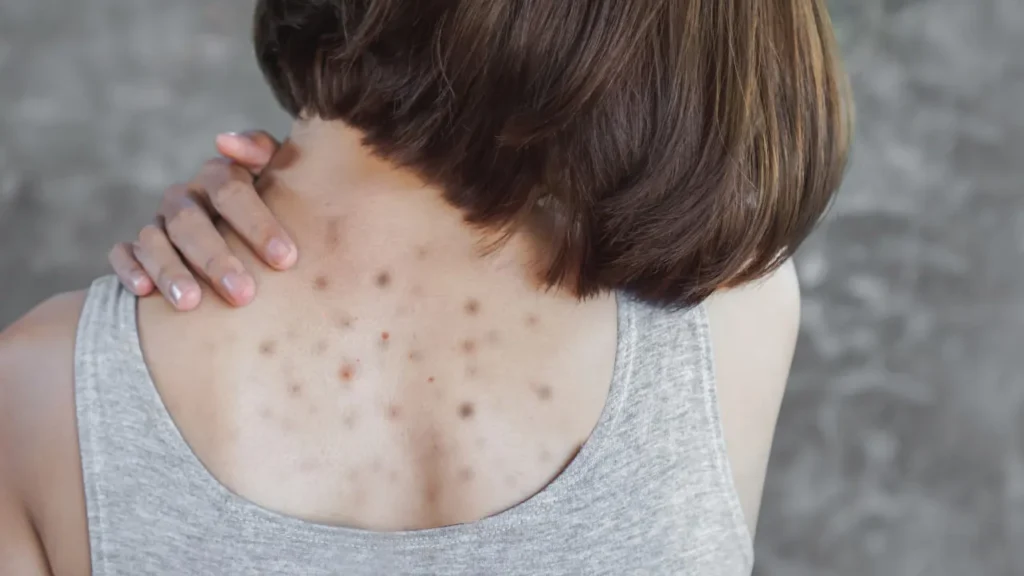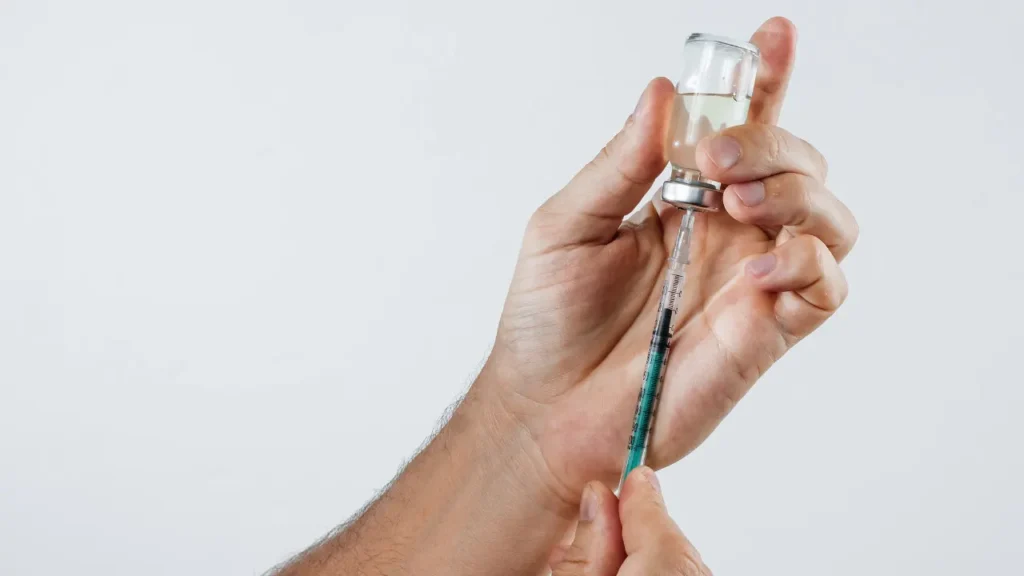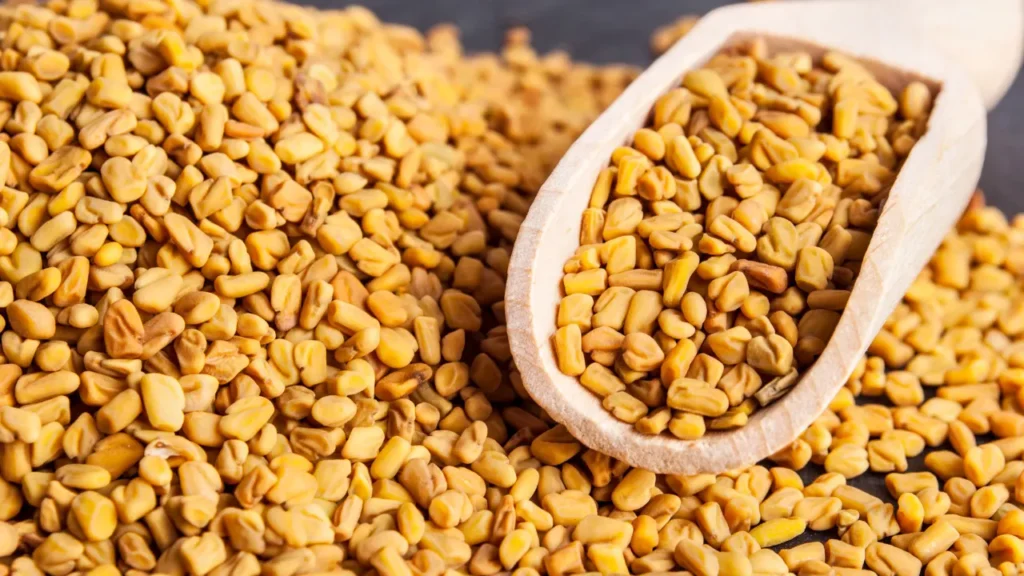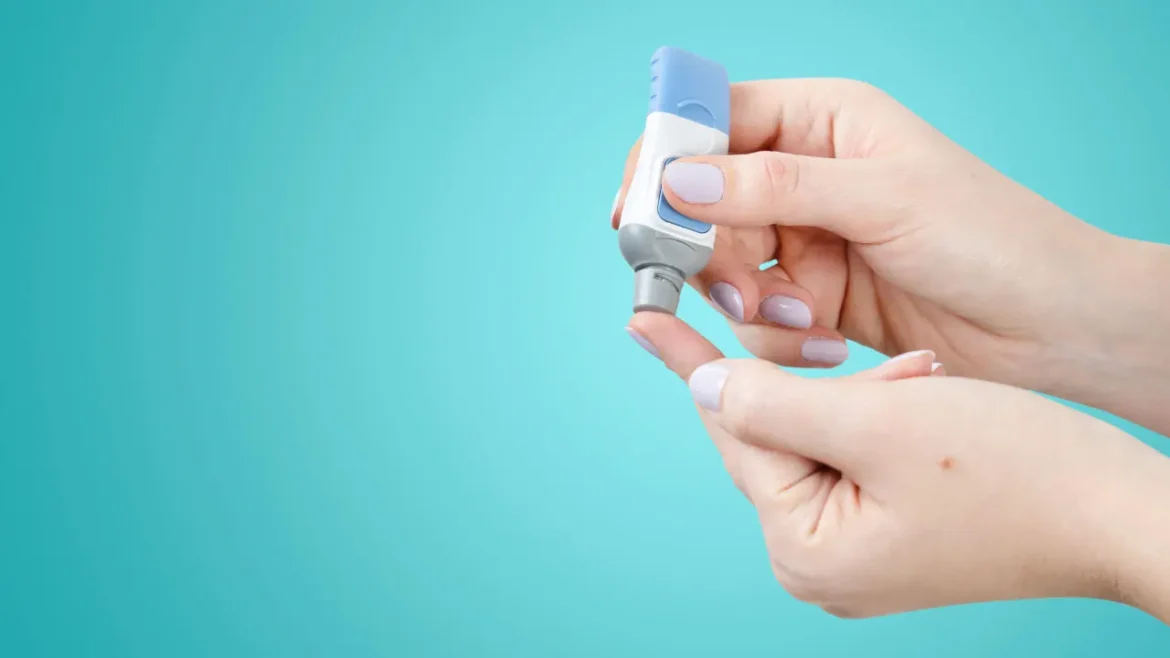Description
Diabetes is a long-term metabolic illness marked by high blood sugar levels brought on by the inability of the body to produce or use insulin efficiently. Millions of individuals around the world are impacted, making it a rising global health concern. Numerous skin issues might be brought on by diabetes. Dry skin constitutes among the most prevalent skin-related warning symptoms associated with diabetes and results from dehydration brought on by frequent urine production. The following are additional diabetes-related skin warning signals: –
Skin infections: Increased blood sugar levels may weaken the body’s immune system, rendering diabetics more prone to skin diseases. Fungal and bacterial infections like candida, staphylococcus, and dermatophytes occur frequently causing diabetes-related skin diseases.
Darkened skin patches: Skin darkening due to diabetes is possible, especially in the groin, armpit, and neck regions. Insulin resistance is the root cause of the acanthosis nigricans disease.
Slow-healing wounds: People with diabetes may develop slow-healing sores, especially on their feet. This medical condition is brought about by poor blood flow, nerve damage, and a weakened immune system.
Skin tags: Skin tags are tiny, benign growths on one’s skin, and they can become more common in people with diabetes.
Itchy skin: Itching can result from high levels of blood sugar, especially in the vaginal region. Yeast overgrowth, which develops in high-glucose conditions, is what causes this health condition.
Reddish, brownish, or yellow skin: Diabetes may alter the color of the skin, especially on one’s shins.
You May Also Like:
HOO RAA CBD VS PARTNERED PROCESS CBD
CBD CONTRACT MANUFACTURER –TOP 5 BEST IN CLASS FOR 2022
Diabetes: Warning signs on your skin: Description, Causes, And Treatment Protocol is an original (HealthXWire) article.
Possible causes
Although the exact reason for diabetes is unknown, it is thought to be a result of a mix of hereditary and environmental factors. Diabetes-related skin symptoms can occur for a variety of reasons, including the ones outlined below: –
Increased blood sugar levels: Elevated blood sugar levels cause poor blood circulation and reduced nerve function.
Insulin resistance: Skin modifications can result from insulin resistance, a feature of diabetes that is classified as type 2.
Hormonal imbalances: Hormonal imbalances brought on by diabetes can result in skin alterations.
Exacerbating and mitigating factors
The signs of skin conditions linked to diabetes may get worse or better for multiple reasons. These are a few exacerbating factors: –
Poor glycemic control: Diabetes skin symptoms including infections, delayed wound healing, and dry skin can get worse with increased blood sugar levels.
Obesity: Increased risk of type 2 diabetes and insulin resistance are two effects of being overweight.
Inactivity: Lack of exercise can exacerbate insulin resistance and raise the possibility of type 2 diabetes.
Stress: Diabetes symptoms on the skin can get worse under stress.
Lifestyle factors: Smoking also drys out the skin and further increases the effect of diabetes.
The mitigating factors include the following: –
Proper glycemic control: Skin issues related to diabetes may be diminished by keeping the blood sugar level within the usual range.
Healthy diet: A well-balanced diet high in fruits, vegetables, whole grains, and lean proteins may lower insulin resistance and enhance glycemic control.
Regular exercise: Regular exercise can increase insulin sensitivity and support the maintenance of appropriate body weight.
Change in lifestyle: Leading a healthy lifestyle, including eating well, and exercising frequently can help to improve glycemic control and circulation.
Stress management: Deep breathing, yoga, and meditation are examples of stress-reduction practices that can also help with glycemic control and general well-being. These practices can enhance skin health and lower the possibility of skin-related problems.

Standard Treatment Protocols
The type and intensity of the ailment determine the conventional treatment regimen for diabetes. The following are the three primary forms of diabetes: –
Type 1 diabetes: According to autoimmune type 1 diabetes, the body attacks and destroys the pancreatic cells that produce insulin. Maintaining glycemic control in people with type 1 diabetes involves frequent insulin injections or the use of insulin pumps. Along with insulin therapy, patients suffering from type 1 diabetes should follow a healthy diet and get frequent exercise.
Type 2 diabetes: A reduced ability to secrete insulin and insulin resistance are two features of type 2 diabetes. The initial course of treatment is dietary and lifestyle changes. If oral drugs are ineffective at regulating blood sugar levels, individuals having type 2 diabetes can also need oral medications to increase their sensitivity to insulin or insulin therapy. Patients with type 2 diabetes might additionally require insulin therapy if their condition is severe.
Gestational diabetes: Pregnancy-related diabetes is known as gestational diabetes. The main course of therapy for gestational diabetes is modifying one’s lifestyle, like maintaining a balanced diet and doing regular exercise. To keep their blood sugar levels under control when pregnant, some women may need insulin therapy.
Patients suffering from diabetes are recommended to maintain good glycemic control along with caring for their skin. This includes avoiding abrasive soaps and chemicals, maintaining clean and hydrated skin, and treating wounds, scratches, and skin infections right away.


Treatment options
Numerous alternative therapy options exist alongside traditional medications for diabetes. The following are some of them: –
Prescription medications: Diabetes can be treated with a variety of prescription drugs, including oral medicines and insulin injections. To boost insulin sensitivity or production, oral medicines such as sulfonylureas, metformin, and thiazolidinediones are frequently utilized. Glycemic control is maintained by injectable insulin, which includes short-acting, rapid-acting, long-acting, and intermediate-acting insulin.
Over-the-counter formulations: Diabetes patients frequently utilize over-the-counter products like test strips, glucose meters, and lancets to keep track of their blood sugar levels.
Nutritional supplements: The management of diabetes and the skin can benefit greatly from nutritional supplements. The following are some dietary supplements that might be useful:
- Vitamin D
A crucial part of many bodily functions, such as immune system performance, insulin sensitivity, and bone health, is played by the fat-soluble vitamin, i.e., vitamin D. Patients suffering from diabetes frequently lack vitamin D, and studies have linked lower vitamin D levels to a higher risk of complications from diabetes.
- Omega-3 fatty acids
Fish, seeds, and nuts are sources of the polyunsaturated fat known as omega-3 fatty acids. Omega-3 fatty acids are being demonstrated to enhance glycemic management and decrease inflammation, which may lessen diabetes-related skin problems.
- Magnesium
Magnesium is an essential mineral that affects a variety of bodily functions, such as insulin sensitivity, glucose metabolism, and blood pressure control. Patients are encouraged to take magnesium supplements to help increase magnesium levels in the body.
- Chromium
A mineral termed chromium is involved in insulin sensitivity and glucose metabolism and patients with diabetes frequently have chromium deficiencies.
Natural and herbal remedies: The following natural and herbal treatments might increase the efficacy of traditional treatment: –
- Cinnamon
It has been demonstrated that cinnamon may help with glycemic management. In diabetics, cinnamon may help enhance insulin sensitivity and lower blood sugar levels.
- Fenugreek
Fenugreek has been utilized in conventional medicine for its possible benefits in controlling the glycemic index. It may also aid people with diabetes by increasing their insulin sensitivity and lowering their blood sugar levels.
- Aloe vera
Aloe vera is widely acknowledged to have healing properties and may aid in the management of skin issues brought on by diabetes. Aloe vera may relieve scratchy, dry skin and reduce the risk of skin infections.
- Ginseng
For its potential advantages for general wellness and health, ginseng is a type of herbal plant that has been utilized in traditional medicine. Ginseng is believed to help with improving the glycemic index.
- Alpha-lipoic acid
Alpha-lipoic acid could possess antioxidant effects, aid in better glycemic management, and lower the risk of diabetes-related problems, including those affecting the skin.
- Milk thistle
The plant milk thistle is being demonstrated to have potential advantages for liver health. Research has shown that milk thistle can help enhance glycemic control in diabetics, who depend heavily on their liver for controlling blood sugar levels.
Acupuncture: Acupuncture may also be helpful in managing diabetes. Studies have shown that acupuncture may improve glycemic control and reduce diabetes-related complications.
Mind-body therapies: Yoga and meditation are two examples of mind-body practices that can be beneficial in treating diabetes. According to studies, yoga and meditation can help diabetic patients with glucose management, stress reduction, and quality of life.


Conclusion
People with diabetes have to regularly monitor their blood sugar levels and always follow their prescribed medicine due to their body’s inability to maintain normal insulin levels. Overall, when one has high levels of blood sugar, it will result in a weakened immune system and slower healing sores.
Hence, diabetes is linked tightly with some skin conditions such as skin tags, itchy skin, darkened skin patches, slow-healing wounds, etc. The type and intensity of the treatment protocols differ based on the type of diabetes. Aside from prescribed medications, patients can try to improve their conditions with some nutritional supplements to better maintain their glycemic index. Numerous research and studies need to be done to improve the well-being of those with diabetes and skin problems.


Additional resources for further reference
https://www.aad.org/public/diseases/a-z/diabetes-warning-signs
https://www.healthshots.com/beauty/skin-care/7-warning-signs-of-diabetes-that-appear-on-your-skin/
https://my.clevelandclinic.org/health/articles/12176-diabetes-skin-conditions
Important Note: The information contained in this article is for general informational purposes only, and should not be construed as health or medical advice, nor is it intended to diagnose, prevent, treat, or cure any disease or health condition. Before embarking on any diet, fitness regimen, or program of nutritional supplementation, it is advisable to consult your healthcare professional in order to determine its safety and probable efficacy in terms of your individual state of health.
Regarding Nutritional Supplements Or Other Non-Prescription Health Products: If any nutritional supplements or other non-prescription health products are mentioned in the foregoing article, any claims or statements made about them have not been evaluated by the U.S. Food and Drug Administration, and such nutritional supplements or other health products are not intended to diagnose, treat, cure, or prevent any disease.
Table of Contents


